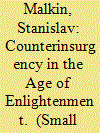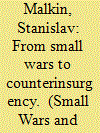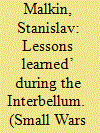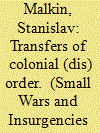| Srl | Item |
| 1 |
ID:
181955


|
|
|
|
|
| Summary/Abstract |
One of the first and closest ‘laboratories’ of the British Empire in terms of turning the British army into a colonial institution during protracted counterinsurgency was one of the inner Gaelic fringes of the United Kingdom, the Highlands of Scotland. It was there in the first half of the Eighteenth century that the army appeared as a corporate institution with its own views not just on its role in the defeating the Jacobite movement, but in resolving the ‘Highland Problem’, acquiring and applying militarily useable topographic and ethnographic knowledge as well as coercive power. The military presence in the Highlands of Scotland was based on intelligence, collaboration with local allies, social control and working civil-military relations, despite the lack of the unity of command during the whole period of the Jacobite movement. This was the dark side of the Enlightenment: the growth of knowledge about rebellious populations of the European empires that had been tested on the lines of ‘enlightened’ pacification and added to the toolbox of colonial counterinsurgency. It would help shape later methods of colonial counter-insurgency in the next century.
|
|
|
|
|
|
|
|
|
|
|
|
|
|
|
|
| 2 |
ID:
167192


|
|
|
|
|
| Summary/Abstract |
The complicated problematic of Imperial Policing in many respects still comes down to the principle of minimum force, and much of what we consider an integral part of the modern doctrine of counterinsurgency, is perceived as by-product of post-1945 colonial experience. Charles Gwynn wrote about it in his still underestimated text-book on internal security, ‘Imperial Policing’. As a result, there is a lack of clear understanding how colonial (based on local experience) knowledge was transformed into the expert (universal, transferable) knowledge in confronting rebellions at the doctrinal level. This article examines the work of Gwynn as part of a transitional stage from the age of global empires to the age of nuclear superpowers within the context of internal security doctrine. Adaptation to the new realities during the interwar period and after the World War II – reconfiguration of the British army epistemological system in confronting insurgencies – was a hard process. In this sense, the question about transformation of colonial knowledge into expert knowledge onto the field of internal security is a part of a more general and sensitive question about transition from colonialism to the post-colonial age.
|
|
|
|
|
|
|
|
|
|
|
|
|
|
|
|
| 3 |
ID:
181039


|
|
|
|
|
| Summary/Abstract |
Historians generally view the Irish War of Independence as the first and largely unsuccessful experience for the British army in conducting modern counterinsurgency. This article argues that during the Interbellum the ‘Irish war’ became a starting point for the military thought about this type of conflict, although this did not become fully consolidated in the army’s thinking. Some important aspects of the British forces’ conduct in the ‘Irish war’ remained undervalued, not least because of the only official analysis of this conflict, ‘The Record of the Rebellion in Ireland’, was classified for a long time. It strongly challenges traditional and revisionist understanding of this conflict and its implications on the British way of counterinsurgency during the Interbellum. These contradictions between documentary evidence from archives and established methods of historical thinking, as well as correlations of archival material with our understanding of modern counterinsurgencies, will be contrasted and analysed in this article.
|
|
|
|
|
|
|
|
|
|
|
|
|
|
|
|
| 4 |
ID:
188332


|
|
|
|
|
| Summary/Abstract |
The article analyses the gaps and ties betweenthe doctrine and theory, in contrast with the practice, of countering subversive movements in the British Empire during the Interbellum. Contradictions between security services led to the articulation and promotion of different models of counterinsurgency. The research contains an analysis of the guerrilla warfare concept’ evolution within the military thought, through the second Boer war, Irish warof Independence and the second Arab rising in Palestine, reflecting different thoughts on interrelated problems of the ‘revolutionary movements’ and ‘sub-war’ after the Great War. Particular attentionis paid to military and political incentives and constrains of the counterinsurgency doctrine, reflecting the bureaucratic logic that stood behind the implementation of the guerrilla warfare concept at the levels of doctrine and theory in the context of the systemic crisis of empire and the growth of external pressure over the questions of the imperial defense and self-determination. Conflicting coexistence of internal security models tested within the British Empire during the Interbellum is observed in the conclusion,as well as perspectives of transfers of colonial (dis)order in front of the ‘sub-war’, as it was understood among the military circles through the prism of the guerrilla warfare concept.
|
|
|
|
|
|
|
|
|
|
|
|
|
|
|
|